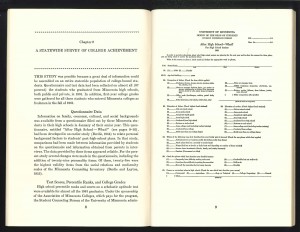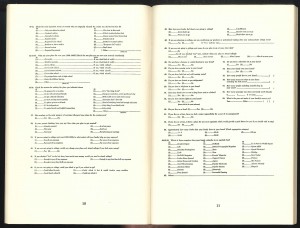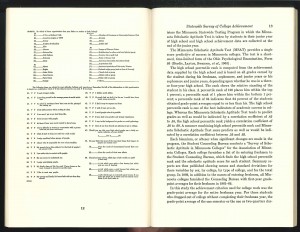Albert B. Hood, a professor at the University of Iowa from 1965 to 2000, made it his goal to help college students reach their full potential. His wanted to find probable factors for student success in college, and attempted to find parallels from student home life or personality and success in certain atmospheres or learning environments.
Over the course of his career, he was credited with creating several tests to measure student identity and college success; however it all started with his 1968 study called “What Type of College for What Type of Student.”
This correlational study followed every graduating high school senior in the state of Minnesota in 1961 through their first semester of college, all 18,000 of them!
The sample could have been even larger but Hood excluded students from the study who were not planning on continuing their education in state, or who had the same name as another student already participating in the study- which could have been avoided by using numbers to identify participants instead of names, but that is beside the point.)
Hood asked students to complete an extensive questionnaire to determine their personality type, socioeconomic status, parents’ education level and income, among other factors A blank questionnaire is pictured below.
Hood tracked students GPAs in both high school and their first semester of their freshman year of college and had students take the MSAT (Minnesota Student Aptitude Test).
Hood’s showed that students whose fathers were unskilled laborers had no difference in college GPA than students whose fathers were skilled workers, and that a father’s occupation seemed to have no bearing on the college or university the student chose to attend (pg. 47). He found that students with equal or similar high school GPA and MSAT scores did slightly better in school if they scored high on extraversion (pg. 74). However, extroverted students did poorly in schools of agriculture or Technical Institutes while introverts seemed to thrive in these schools (pg. 73).
Hood also found that students who were raised on a farm had significantly higher college GPAs than their city counterparts (pg. 55). That data is growing increasingly out of date, as the farming industry has shrunk significantly in the United States since 1961, and it would be interesting to see if that conclusion still holds even as the population size has shrunk.
Hood’s research questions are still being explored today. A large scale study is currently being conducted with Furman University, Davdison College, Duke University, and Johnson C. Smith University on the class of 2018 to try to determine college success through “individual, interpersonal, and institutional factors” just like Hood attempted to find in 1968 (Fourtitude).
[Albert B. Hood photograph]. (2005). Retrieved from http://www.iowalum.com/daa/search/profile.cfm?ID=202
Hood, A. B. (1968). Minnesota Studies in Student Personnel Work: Vol. 14. What Type of College for What Type of Student? Minneapolis, MN: University of Minnesota Press.
The Fourtitude Project. (2014). Retrieved 2015, from Fourtitude Project website: http://youatfurman.org



